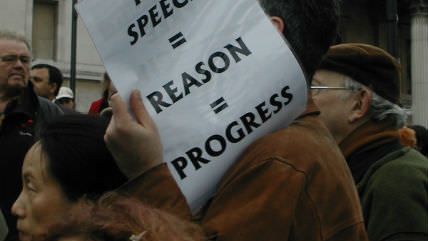For Progressives, First Amendment Comes in Second
Many see it as merely a means to certain ends.

Progressive America is troubled. Some of its leading lights fret that if something is not done soon, government will actually need a good reason to censor other people's speech.
Such is the ominous upshot of a seemingly minor Supreme Court case that could have "far-reaching consequences," as The New York Times put it recently.
The case (Reed v. Town of Gilbert) concerned a sign ordinance in Gilbert, Ariz., that imposed tighter restrictions on church signs than on political ones. The entire Supreme Court said that was ridiculous, and struck the measure down. Government cannot blithely discriminate against certain speech or speakers based on content.
Six of the justices said the test known as strict scrutiny—which requires government to cite a compelling state interest for a law, and to tailor the law narrowly to fit that interes—applies not just to some narrow forms of censorship, but to any topic-based restriction on speech.
As The Times' Adam Liptak notes, "the decision has already required lower courts to strike down laws barring panhandling, automated phone calls and 'ballot selfies.' '' He cites Robert Post, dean of Yale Law School, who takes the view that the court (in Liptak's words) "did not think through the consequences" of its ruling in the sign case.
And thereby hangs a tale. In recent years it has become increasingly obvious that many liberals view the right to free speech as an instrumental good, rather than an intrinsic one—i.e., they favor free speech not as an end in itself, but merely as means to achieve other ends. And wherever free speech impedes other agendas, wherever it produces consequences liberals find discomfiting, it should give way.
Ballot selfies erode the privacy of the voting booth, which in turn could make vote-buying and voter intimidation easier. Hence New Hampshire passed a law last year that subjected anyone displaying a ballot selfie to a $1,000 fine. Other states are considering similar measures—or at least they were, until a federal court struck down New Hampshire's law, on the grounds that such photos enjoy First Amendment protection.
Similar concerns animate efforts to amend the Constitution to overturn Citizens United. In that case, the government wanted the authority to prohibit the dissemination of a movie; the Supreme Court said the nonprofit group Citizens United had a First Amendment right to air it. Critics of the ruling think government should restrict some people's speech in the name of a "level playing field."
In a similar vein, many progressives detest First Amendment protections against business regulations. Post, for example, wrote with alarm about a court ruling that struck down tour-guide licensing in Washington, D.C. on First Amendment grounds.
Around the country, other small entrepreneurs—veterinarians, dieticians, even newspaper columnists—have challenged similar occupational licensing on free-speech grounds as well. "The First Amendment,"Post bemoaned, "seems to have been transformed into a straitjacket for our institutions of democratic governance."
Well, yes. That's exactly what the Bill of Rights is for.
***
A Harvard professor, Jerry Avorn, has objected to another recent federal court ruling that upheld the speech rights of business interests. Earlier this month a Manhattan district judge said the FDA could not prohibit drug companies from providing truthful, non-misleading information about non-label uses for various drugs.
As health-care writer John Goodman noted in Forbes, prior to the ruling drug company employees could go to prison simply for giving doctors copies of peer-reviewed research published in medical journals showing that a drug approved to treat Disease X also turns out to be effective in treating Disease Y. (This despite the fact that doctors are perfectly free to prescribe drugs for such off-label uses.)
Avorn thinks that's how things should remain—and wrote as much in a journal article titled, "In Opposition to Liberty: We Need a 'Sovereign' to Govern Drug Claims." Even if doing so violates the First Amendment? Apparently so.
Back in March, Liptak noted that while "liberals used to love the First Amendment… that was in an era when courts used it mostly to protect powerless people like civil rights activists and war protesters." But now business interests are seeking free-speech protections, and courts are obliging. "Once the patron saint of protesters and the disenfranchised, the First Amendment has become the darling of economic libertarians," complains Columbia University law professor Tim Wu.
The attitude revealed by such laments was best summed up by Nat Hentoff in a book title: Free Speech for Me—But Not for Thee.
It is not comforting that complaints like these come from some of the country's leading legal minds, because they expose a grievous misunderstanding of rights.
Rights are, as legal philosopher Ronald Dworkin put it, "trumps" that outweigh competing considerations — not because of cost/benefit calculations but by definition. Their intrinsic worth does not increase or diminish depending on who exercises them. It is just as wrong to allow censorship of one speaker—rich or poor, black or white, Koch brother or Occupy Wall Street protester—as it is to allow censorship of another. And it is impossible, in any intellectually honest way, to protect the free speech of some speakers without adopting general principles that protect the free speech of all others.
This helps explain the trend noted by Harvard law professor Lawrence Tribe in a March essay, which he sees as transforming First Amendment law "into a charter of largely untrammeled libertarianism in which the regulation of virtually all forms of speech and all kinds of speakers is treated with the same heavy dose of judicial skepticism."
That, he might have added, is exactly as it should be.


Show Comments (95)